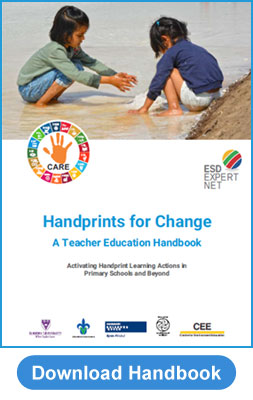To support teacher educators and teachers in introducing Education for Sustainable Development (ESD) in the classroom a set of educational resources have been developed under this initiative. These resources have emerged from collective experiences to develop a pedagogy that carries the spirit of the “new social contract for education” (UNESCO), the Sustainable Development Goals (SDGs) and the learnings and experiences from the work during the UN Decade on ESD.
The Handprint CARE educational resources have been developed with the support of the German government through Engagement Global with the Centre for Environmental Education, Ahmedabad convening an action-learning process with individuals and working groups in Mexico, India, Germany and South Africa.
These educational resources are developed for teacher educators, teacher trainers and teachers, which could be used in conducting trainings of primary and upper primary pre-service or in service teachers on ESD. Some of the educational resources could be used directly by teachers for using Handprint CARE approach in teaching and learning process.
The resources include the teacher educator’s handbook and web resources including videos, presentations, exemplars and thumbnails. The educational resources are simple, ready to use, well-illustrated and can be used by teacher educators/teachers of primary and middle schools anywhere in the globe. These resources can be shared with teachers from your school/other schools in your country for collaboration as a community and to start thinking and taking Handprint actions for the common good.
 The handbook has been developed to support teacher educators to train and guide teachers in introducing ESD in school subject teaching. There are three sections, however it is not required to follow any sequence while using or referring to this handbook.
The handbook has been developed to support teacher educators to train and guide teachers in introducing ESD in school subject teaching. There are three sections, however it is not required to follow any sequence while using or referring to this handbook.
The Handbook has been developed keeping in mind that teachers can use this as open resources, which can be easily adapted, based on the local and specific school subject requirement. Teacher educators can use the handbook to develop their own ESD teacher-training module using the Handprint CARE approach. Along with this handbook, a set of online resources have also been developed to provide educators and teachers access to more reading materials to use and adapt to their own needs and context.
Part one has ten chapters developed around questions which are likely to be asked by teachers on ESD in their subject teaching in primary education settings. The ten chapters can be read in any order or studied in sequence as a teacher education programme. Each chapter is introduced with a leading question to help readers engage with the text, to explore key aspects of ESD in their teaching, to help teachers and guide their deliberative learning. In this way teachers can clarify and plan how to mediate ESD as evaluative learning around local matters of concern and towards Handprint learning actions that will contribute to future sustainability.
Part two contains a selection of exemplars for environment and sustainability topics. The level of the exemplars provided is appropriate for the age group 6-13 years but can be adapted for use with other grades by creative teachers. All the materials are intended to provide illustrative starting points; they are not 'completely finished'. Most have been developed around real-world start-up stories that invite learners to share their own stories and experiences and to raise questions for learner-led inquiry, evaluative deliberation and action.
Part three explores picture sequences as starting points for students to narrate stories that 'show us the way' to more just, positive and hopeful futures. Japanese Kamishibai paper theatre inspired Gcina Mhlophe, the famous African storyteller, to note how start-up stories can motivate students to write their own stories that can 'point the way' (umkomba ndlela). In this way, learners re-imagine and re-write how they can live together better in a changing world. Similarly, emancipatory stories in Mexico and story-telling traditions in India inspire positive, ethics-led learning and change.
The web resources developed along with the handbook to help teacher educators and teachers access a wide variety of useful resources on various themes and concepts. The resources include: